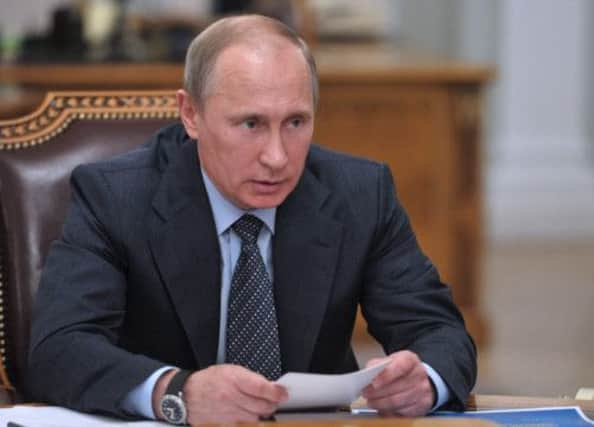Dani Garavelli: Putin would be victor in Olympics boycott


In part, I think, my scepticism stems from the fact that it seems like no time at all since we had such a law ourselves. Admittedly, Russia seems to be applying it more enthusiastically, but Section 28 – which was scrapped a decade ago in England (three years earlier in Scotland) – also provided a forum for anti-gay rants from the likes of Brian Souter and legitimised playground bullying.
Now we’re reaching a stage where equal marriage looks set to become a reality, but does our belated (and still incomplete) enlightenment really allow us to claim the moral high ground? This is not to say we shouldn’t be protesting against Russia’s stance, but rather than pulling out of the event, wouldn’t we be better to demonstrate what we have gained by creating a more inclusive society?
Advertisement
Hide AdAdvertisement
Hide AdThe problem with boycotts, whether they take the form of Twitter silences or withdrawing from competitions, is they deprive the very people they are designed to support of a platform. Many people still believe countries opposed to the Nazi regime should have stayed away from the 1936 Olympics, but if they had, Jesse Owens would have sacrificed his four golds medals and the world would have missed out on a black man standing victorious on the podium at a games designed to demonstrate the superiority of the Aryan race.
Withdrawing co-operation may be superficially attractive. But which is the more compelling response to Russian pole-vaulter Yelena Isinbayeva, who last week criticised Swedish high jumper Emma Green-Tregaro’s decision to compete in the world championships in Moscow with her fingernails painted in the colours of the rainbow flag, and branded homosexual relationships abnormal: a refusal to take part or another flamboyant gesture of solidarity? And wouldn’t the absence of LGBT competitors such as figure skater Johnny Weir – whose glitzy outfits provoked much debate at the 2010 Olympics – be a victory of sorts for Russian president Vladimir Putin?
Russia despises openly gay people and, lo, its games are a homosexual-free zone – that’s the kind of self-defeating purpose a boycott would serve.
No wonder the gay sportsmen and women who have spent years training have rejected the idea which began to gather momentum when actor Stephen Fry wrote an open letter to the prime minister and the International Olympic Committee. Australian tennis player Rennae Stubbs, US diver Greg Louganis and Weir have all pointed out it is the athletes themselves who will suffer if it is followed through. “There isn’t a police officer or a government that, should I qualify, could keep me from competing in the Olympic games,” said Weir. Now, that’s what I call taking a stand against discrimination.
There are other problems with a boycott, too. Almost every country has its share of objectionable policies. You have to ask yourself if not China – where free speech is stifled and dissidents disappear – then why Russia? And if Russia, then why not Brazil with its widespread use of torture, or the US with its drone strikes?
However, most importantly, boycotts are a bad idea because they don’t work. Not only did the US’s decision not to attend the 1980 Moscow Olympics in protest at the USSR’s invasion of Afghanistan not see the Soviets beat a hasty retreat from the country, the bad feeling it created led the USSR to boycott the 1984 Los Angeles Olympics in response.
Boycotts don’t work because they close down the conversation; once you’ve withdrawn, there’s nothing left to say. They may have a financial impact but it’s short-lived, unlike sanctions which can strangle an economy. As likely as not, the event will go ahead anyway. Everyone else will have a good time and you will have passed up an opportunity to keep your cause in the public eye.
This is why, for me, noisy dissent will always beat storming out. If we want to show our disapproval of Putin’s anti-gay law, then we should be there at Sochi, telling everyone from government ministers to cafe owners why it’s wrong. We should be protesting, and we should be doing it in such numbers and with such gusto that Putin has no choice but to listen.
Advertisement
Hide AdAdvertisement
Hide AdIn an ideal world, of course, we would rally behind our gay athletes, but – and here’s why these Olympics could prove a “teachable” moment for us as well as Russia – there aren’t very many of them: there’s boxer Nicola Adams, equestrian Carl Hester, cricketer Steve Davies and rugby player Gareth Thomas.
While there are now homosexual role models aplenty in the arts and politics, gay sportsmen and women are still reluctant to come out for fear of the reaction. As Thomas said: “I wouldn’t want to go and represent my team or my country every week if I knew 20,000 people were going to abuse me.” And that’s the sad thing: for all our country has come on leaps and bounds, homophobic name-calling is still commonplace in our schools and stadia.
There is much progress to be made on LGBT rights here, as in many other countries. But by waving our rainbow flags, singing I Am What I Am and generally expressing our solidarity with gay athletes, we might not only embarrass Russia, we might foster the kind of supportive atmosphere that finally makes it possible for more of our own gay sports people to be more open about their sexuality. «
Twitter: @DaniGaravelli1